Former Football Player Returns To Marshal In New Career
Jan. 30, 2014
SHSU Media Contact: Jennifer Gauntt
Story By: Linda Gilchriest
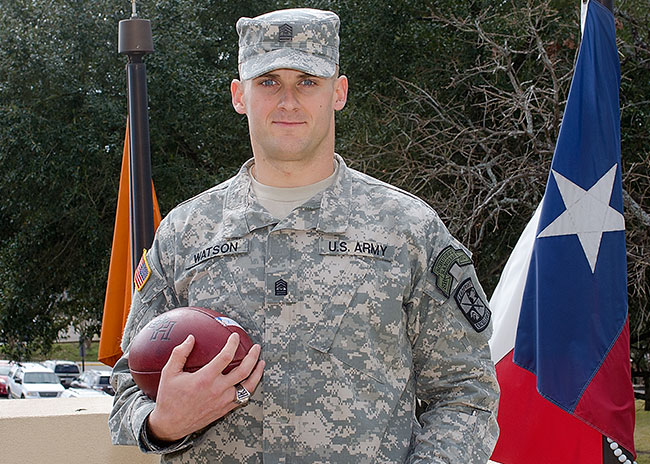 |
| Travis Watson, a former center for the Bearkat football team, has always been "military minded." Though choosing SHSU over a military college, Watson continued preparing for an Army career throughout his undergraduate years. Since graduating, he has returned to SHSU and is now a cadet in SHSU's ROTC program with the hopes of commissioning as an Army officer. —Photo by Brian Blalock |
Travis Watson began the New Year combining his passions of football and the military into a four-day weekend he will never forget.
Watson, 25, was one of only 24 ROTC cadets to be selected as cadet marshals for the Army All-American Bowl in San Antonio. These cadets from around the country oversee combines, or field drills, for sophomore and junior football standouts looking to gain some national attention and generate college scholarship interest.
You might say that Watson was a perfect man for the job.
As a center for the Sam Houston State University Bearkat football team from 2008-2011, Watson was the first football player at the university to be named the Southland Conference “Student-Athlete of the Year.”
After graduating with his bachelor’s degree in 2012, Watson joined the Army National Guard and then returned to SHSU to work on his master’s degree while serving as cadet sergeant major for SHSU’s Reserve Officer Training Corps.
“I was excited to be selected (as a cadet marshal)” Watson said. “It was another chance for me to do something related to football. After I finished (playing) I was pretty much just focused on the military. But (for the bowl) I was getting to go and interact with some of the younger guys, some of the up-and-coming top college prospects in the country. I got to mix two of my favorite things—military and football—two things that have given me so much.”
The Football Field or the Battle Field?
Watson has attended his share of football combines, beginning during his high school career in Norman, Okla.
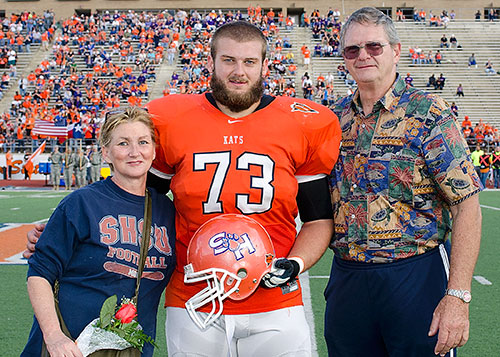 |
| Watson with his family in 2001, on senior day (above) and protecting quarterback Brian Bell after the snap (below). —Photos by Brian Blalock |
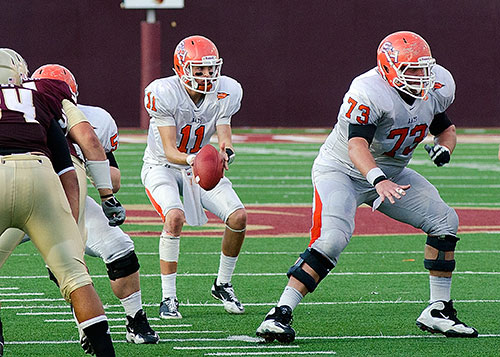 |
“Basically, it is a skills test. The coaches want to see what your 40 (yard dash) time is, they want to see how many reps you can bench press…they want to see your sprint time,” he said. “It is for scouts to look at you, see you in person and see your numbers on paper. It is a great recruiting tool.”
Although Watson said he received some attention at the combines he attended, he broke his foot his senior year at North Norman High School and fell off the radar with scouts from the big-name colleges.
SHSU came knocking by word-of-mouth; some of his high school coaches knew SHSU coaches. When recruitment time rolled around, Watson was considering scholarship offers from both The Citadel in South Carolina and SHSU.
He said he was taking his offer from The Citadel very seriously, but he wasn’t certain he wanted to be in the military at that time.
“I knew it was always something that I had a passion about; I thought going to The Citadel would seal the deal for me,” he said.
He went to Charleston, S.C., toured the campus and actually committed to play football at the military academy. Watson said he told coaches at SHSU he would not be coming here for a visit, but two weeks later he changed his mind.
“I came down here right before my signing day, and I realized this is where I felt comfortable, where I felt I would have a better shot at winning, and where I could see myself spending four or five years,” he said. “I de-committed from The Citadel and committed to Sam Houston. And I never looked back.”
Watson says he hadn’t decided on a major before arriving on campus.
“When I got my football scholarship to college, that took over everything. I threw myself into the sport,” he said, “but once I was finished, I realized that I did want to join the military. I started looking at the different branches, but it was really the Marines or Army the entire time because I wanted to go infantry.”
Watson’s grandfather served as a U.S. Marine in the Pacific theater during World War II, and the young athlete said he “kind of modeled myself after him.”
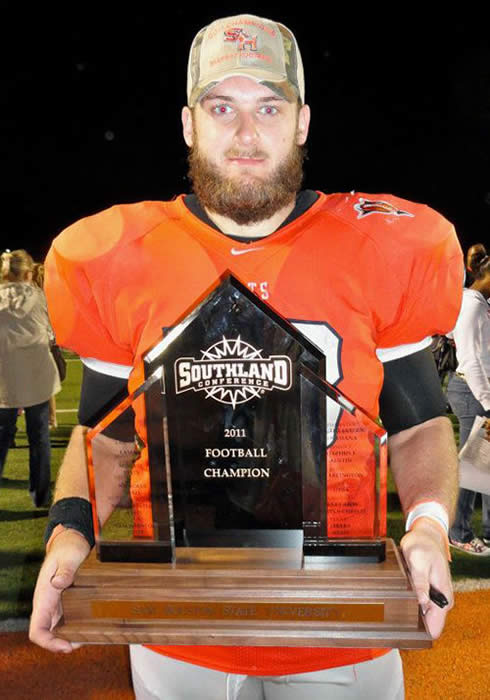 |
| Watson in 2011 after the football team was announced as the Southland Conference championships. — Submitted photo |
When Watson started looking at the military as a career, he turned to members of the SHSU coaching staff who had been soldiers. Lee Hays, a former offensive line coach and a former Marine, was Watson’s mentor. He guided the young player to the Army because, he said, there was more upward mobility.
At the same time, the seed of a military career germinated in the political science class “International Conflict and Global Terrorism” taught by department chair Rhonda Callaway.
“Dr. Callaway really helped me a lot throughout my undergrad, guiding me in the right direction. That class intrigued me so much; it piqued my interest and I thought, now this is what I really enjoy.”
He changed his major from history to political science and found a passion for the study of terrorism, particularly Middle East terrorism, so he minored in history and Middle Eastern Studies. He also took Arabic language classes.
To further his education, he applied for and received scholarships to study abroad and spent a summer studying the Arabic language and culture in Amman, Jordan.
“It was amazing. It was one of the best experiences of my life,” Watson said. “I really love traveling and I love history. While I was there, I got to travel to Israel, which is one of the places I’ve always wanted to go. I got to go to Jerusalem and see all the Christian holy sites.”
In Amman, he soaked in the culture and its history.
“I learned a lot while I was there. Basically, it gave me what I needed to know—that I was doing what I really enjoy. The Middle East has been my focus.”
Going Army
After the Bearkats finished their Southland Conference-championship run at the national championship game during Watson’s senior year, he met with former coach Willie Fritz, whom Watson said liked to talk with his seniors about their career goals.
“We talked about football a little bit. I had a great senior year. I was a first-team All-American as a center,” Watson said. “Coach Fritz sat me down and said that I wasn’t going to be drafted, but if I wanted to pursue football I would have to work very hard, take a shot at free agency and maybe make a practice squad.
“At that time, I had been through five or six surgeries. I realized what I really wanted to do with my life would have to be put on hold to accomplish that (pursuit of football), but I just wasn’t willing to put that on hold,” he said. “I wanted to get into the military pretty much as fast as I could. That’s when I got involved with ROTC because he (Fritz) suggested I talk to the former battalion commander Lt. Col. David Yebra.”
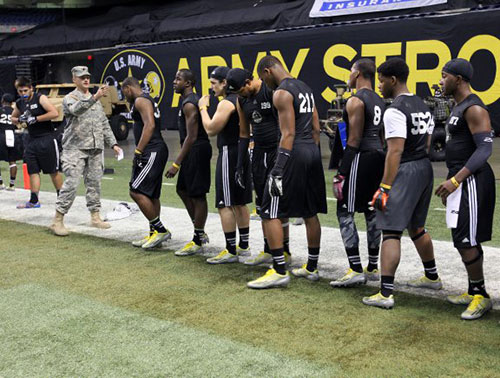 |
| Watson directs college football hopefuls as a cadet marshals for the Army All-American Bowl in San Antonio earlier this year. —Submitted photo |
Yebra explained Watson’s options: he could apply to officer candidate school, but entry was difficult and very competitive since the Army was downsizing in view of the end of the war in Iraq and Afghanistan. Or, Yebra told him, he could stay at SHSU to get his master’s degree and serve in the Army National Guard, where he could earn his officer’s commission in two years.
“In the military, if you want to make it past captain, you need to get your master’s degree,” Watson said. “I applied to a new program—security studies—in the College of Criminal Justice, which focuses on homeland security. I got accepted, and it is a great deal for me.”
Watson is in the “Simultaneous Membership Program,” through which soldiers enlist in the National Guard, complete basic and advanced individual trainings, and then come back and drill with your unit. The program offers federal and state tuition assistance.
“Basically, it allows you to train with your unit and get experience while you are a cadet,” he said. “I liked the idea of getting some training on the enlisted side before becoming an officer, so I would know the job I was doing and I would know the job my soldiers were doing.”
Once a month, Watson travels to Laredo to train with his National Guard unit. He said the setup is the “best of both worlds” because he gets to train as part of the infantry but also gets to learn the leadership needed by cadets to take on the role of officer when he graduates.
Watson has won the admiration of the military officers on campus.
“He is going to be able to excel in the military and lead his country,” said Master Sgt. Jonathan Simmons, a senior military science instructor. “He kind of oozes leadership just by the way he walks; the way he talks; the way he conducts himself.
“He definitely leads by example,” Simmons said. “He works hard. He was an athletic academic scholar; he is very interactive and works very well with others. I was so impressed that I yanked him up to be my cadet sergeant major, my right-hand man.
Simmons said based on Watson’s performance and conduct, he reappointed him to the post for another semester.
Watson expects to receive his commission in December.
- END -
This page maintained by SHSU's Communications Office
Associate Director: Julia May
Manager: Jennifer Gauntt
Located in the 115 Administration Building
Telephone: 936.294.1836; Fax: 936.294.1834
Please send comments, corrections, news tips to Today@Sam.edu.

 SamWeb
SamWeb My Sam
My Sam E-mail
E-mail

